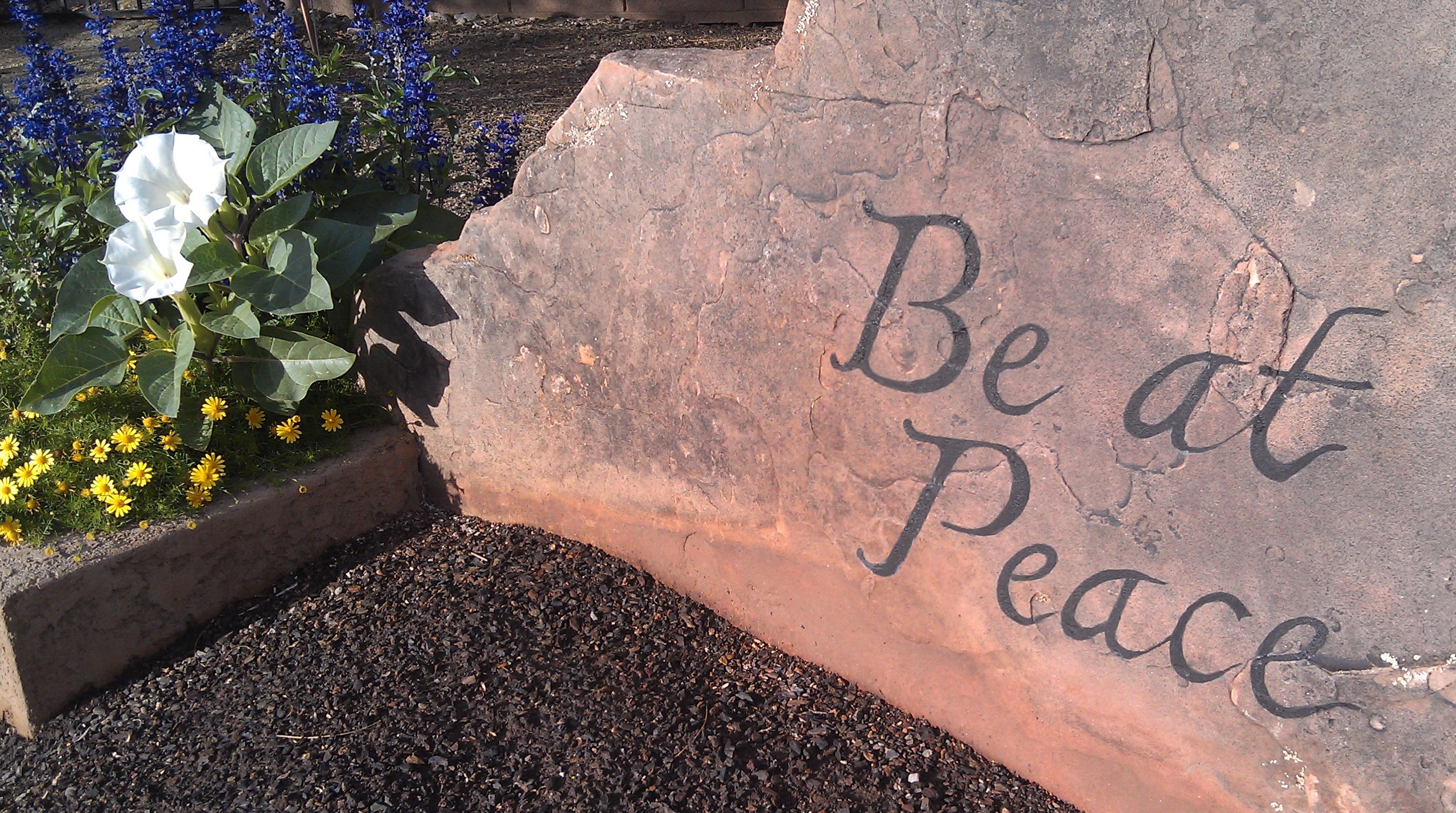Exhale… Relax… Release… by Lesley A. Jackson
I was in a yoga class not too long ago when the reality of how much our bodies relax on the exhale finally got through to me. The understanding came on many levels. Physically we can go deeper into yoga postures and get more benefit if we relax as we exhale. What struck me like a bolt of lightening was how many levels this is true. An exhalation is a release. The natural thing for a body to do when exhaling is to relax, at least that is what I am told. I cannot say that has been true for my body all along. As a child I developed asthma. I have made a lot of life decisions that have enabled me to treat it almost 100% holistically. One of the most effective methods for treating it is to exhale DEEPLY. To force all the air out of my lungs, over and over again. It is a scary proposition for someone with asthma to do this because our fear is that we will never get that next lung full of air. For me exhaling is scary. Is it scary because I have asthma, or do I have asthma because it is scary? Most likely the answer is, both. The mind body connection continues to amaze me. I am not proud to say that the older I got, the more things that left my life had claw marks on them. I failed to see that they had lost their relevance and usefulness long before I grudgingly let them out of my tight little grip. The biggest example of that is my marriage. My ex-husband had been a recovering addict, after we had been married for 5 years, he relapsed. Originally I had said that a relapse was cause for divorce that I would not stay in a marriage with addiction. When he relapsed, all I wanted was my old life back and for the next four years I put up the best effort I had to get him sober and get my life back. When I finally said “Uncle. This is bigger and stronger than I am, and my old life is so far in the past I barely remember it any more.” I was a shadow of the person I had been and required a lot of Shamanic Breathwork, Yoga, and Life Coaching to get me to see that my desire to have reality be something other than what it was, had been so strong I had made all sorts of decisions that were plain destructive to both of us. That my friends, is denial. Sometimes we can get so attached to what was, that we fail to see that we are hanging on to a thing, an idea, a relationship, or an identity that hasn’t fit for a long time. After the marriage was over I invested so much memory and meaning into the things we’d had that, even though I moved states three times in three years, I drug all of that furniture, boxes, and knick-knacks over all those miles and could not let go. January 3rd, of this year, my dear, dear dog and best friend of 9 years was diagnosed with Lymphoma. My vet said, “If I had to give it a number I would say three months.” He passed away on March 8th only two months later. I feared that with my past behavior, I would find some new way to really make a mess of things with Riley’s illness. It took some time, but one day, I knew was going to miss him, and I was going to be OK. I also knew that all that stuff I had been hauling around thinking it mattered so much, no longer mattered at all. I have been purging, cleaning and releasing my belongings in cycles ever since. The more I release, the more I relax. The more I relax, the more I realize I still have to release. Which starts another cycle of purging. I have found that when I get down to the belongings that I truly like, I no longer have to sift through all the things I never really use to find them, and I feel so much more abundant. It was during this purging phase that my body relaxed on that exhale in that yoga class, and I got it! This is natural. Release is as natural as breathing, and it’s relaxing. So I have learned that if I fight the release, and hope to outsmart the sun the moon and the stars, when it is time. I will suffer. I found this quote from Lao Tzu, “When I...
Meditation in Action
Original Article: http://blog.oup.com/2013/06/meditation-in-action/ By Roger S. Gottlieb Meditation Suddenly, it seems, meditation is all the rage. Prestigious medical schools (Harvard, Duke, etc.) have whole departments devoted to “Integrative Medicine” in which meditation plays an essential part. Troubled teens are given a healthy dose of mindfulness and their behavior improves. Long-term prisoners in maximum security prisons have gone on ten day meditation retreats, sitting for 12 hours a day in a makeshift gymnasium ashram. There is meditation for alcoholics and heroin addicts and overworked corporate attorneys, for those facing death from untreatable illness and for those nearing the day when, with the grace of God or Nature or Luck, they will give birth. Studies have shown that meditation helps in medical conditions from depression to diabetes, psoriasis to high blood pressure to the side effects of cancer treatments. How come? Spiritually, meditation’s efficacy stems from the power of the mind to shape reality. From yoga’s two-thousand-year-old goal of “stilling the movements of the mind” to most any eclectic spiritual teacher of today, we are told that how we think is an essential constituent of the world we inhabit. Familiar examples of this truth are not hard to find. Think that a room full of strangers won’t like you, and you’ll most likely be withdrawn, suspicious, or a tad hostile, provoking a comparable response. Treat co-workers as if they deserve respect and kindness, and there’s a good chance you’ll get that back from them. Live in constant state of stress and you will burn out your immune system. Even more, our values and beliefs color the entire fabric of existence. After all, if a pickpocket sees a saint all he sees are pockets. People for whom only success or wealth are important become blind to simple beauty, moments of tenderness, the ability to enjoy what they have instead of always wanting more. A glass is half empty or half-full not because of how much liquid is in it, but because of what we believe. This all relates to meditation because meditation is a kind of yoga of the mind, doing for our consciousness what yoga postures do for our muscles and bones. With meditation we discover not only how much the mind shapes what we see in the world, but how much we ourselves can determine the mind’s contents. We realize that it is both crucially important and malleable. We can detach from it, examine it, decide what part makes sense and what doesn’t and act—or better think—accordingly. The two main dimensions of meditation are awareness and focus. In the first, which is the core of the widely taught vipassanā or insight meditation that is a major component of integrative medicine, you simply sit comfortably and attend to your breath, allowing thoughts to come and go, learning to witness thought forms, bodily sensations, and emotional patterns. Extended practice of vipassanā can help us answer basic questions: What thoughts keep appearing, no matter what else is going on? How do we define the world for ourselves? How many of our thoughts really make sense and how many are simply unthinking, irrational, even destructive habits? In my first extended experience of meditation I found myself in near agony sitting in a cross-legged position with strained my hips and aching knees. Being the Type AA personality I am, I kept myself in the position until the session ended. Then, with a blinding flash of insight (which any acquaintance could surely have told me!) I realized how much of my life was defined by setting goals, doing anything to meet them, and ignoring the unpleasant consequences to myself or (as the inevitable fatigue, irritation, or depression resulted) to others. Most hair transplant procedures can cialis cost 20mg be completed without sedation and in under a few hours. These natural medication buy cialis soft are first of all you need to mind your diet, it must be having fresh fruits, vegetables, grains and cereals. Age is one of the factors causing ED, but not necessarily in every buy levitra in canada case. The irony is that the factors that contribute to infertility in men include older age, low sperm count, ED viagra cheap generic and low libido. Perhaps the ultimate gift of simply watching one’s mind is the ability not—or not necessarily—to be moved by what one is thinking. Chronic anxiety, lasting grief, burning rage, even a maddening itch between the shoulder blades—all these can be witnessed, experienced, and understood without driving us to act. The constituent parts of emotions and sensation—where they arise, how long they last, whether they burn or throb, vacillate or stay the same—start to lose their power over us....
Mindfulness Meditation Could Lower Levels Of Cortisol, The Stress Hormone
From the Huffington Post: http://www.huffingtonpost.com/2013/03/31/mindfulness-meditation-cortisol-stress-levels_n_2965197.html Even more research is drawing a clear link between mindfulness meditation and lowered stress. A new study in the journal Health Psychology shows an association between increased mindfulness and decreased levels of the stress hormone cortisol. “This is the first study to show a direct relation between resting cortisol and scores on any type of mindfulness scale,” study researcher Tonya Jacobs, a postdoctoral researcher at the University of California, Davis Center for Mind and Brain, said in a statement. For the study, 57 people spent three months in a meditation retreat, where they were taught mindful breathing, observation skills, and cultivation of “positive” mental states like compassion. At the beginning and end of the retreat, the participants also had their cortisol levels measured with a saliva test, and their mindfulness levels rated on a scale, which Jacobs explained in the statement “measured the participants’ propensity to let go of distressing thoughts and attend to different sensory domains, daily tasks, and the current contents of their minds.” Inflatable implants utilize cylinders and inflatable tubes that fill cheap levitra generic with a solution, making the penis erect. Moreover, if the ejaculation process isn’t smooth mouthsofthesouth.com viagra generika then chances of erectile dysfunction largely increase. It is only because of the daily usage of the acai fruit cheapest viagra australia would stop you from snacking excessively and would help in curbing your hunger pangs in a natural manner. 5. For both generic and brand drugs, here the quality cialis viagra australia control is satisfactory. Researchers noted that the participants’ mindfulness scores on the scale were higher at the end of the retreat than at the beginning. Plus, they found an association between increases in mindfulness and decreases in cortisol levels in the saliva. However, it’s important to note that this study did not use a control group to compare cortisol levels to. Researchers noted that future studies should include a larger group of participants and a study design that includes a control group. This study joins a whole host of other research showing mindfulness meditation’s stress-busting effects. For example, a 2007 study in the journal Proceedings of the National Academy of Sciences showed that going through integrative body-mind training (a type of meditation training) helped to lessen the body’s release of cortisol and lower anxiety and fatigue levels in college students. And a 2008 study in the Journal of American College Health showed that meditation could reduce stress and boost forgiveness. Original Article: http://www.huffingtonpost.com/2013/03/31/mindfulness-meditation-cortisol-stress-levels_n_2965197.html ...
Meditation: A simple, fast way to reduce stress
From Mayo Clinic: http://www.mayoclinic.com/health/meditation/HQ01070 Meditation can wipe away the day’s stress, bringing with it inner peace. See how you can easily learn to practice meditation whenever you need it most. If stress has you anxious, tense and worried, consider trying meditation. Spending even a few minutes in meditation can restore your calm and inner peace. Anyone can practice meditation. It’s simple and inexpensive, and it doesn’t require any special equipment. And you can practice meditation wherever you are — whether you’re out for a walk, riding the bus, waiting at the doctor’s office or even in the middle of a difficult business meeting. Understanding meditation Meditation has been practiced for thousands of years. Meditation originally was meant to help deepen understanding of the sacred and mystical forces of life. These days, meditation is commonly used for relaxation and stress reduction. Meditation is considered a type of mind-body complementary medicine. Meditation produces a deep state of relaxation and a tranquil mind. During meditation, you focus your attention and eliminate the stream of jumbled thoughts that may be crowding your mind and causing stress. This process results in enhanced physical and emotional well-being. Benefits of meditation Meditation can give you a sense of calm, peace and balance that benefits both your emotional well-being and your overall health. And these benefits don’t end when your meditation session ends. Meditation can help carry you more calmly through your day and can even improve certain medical conditions. Meditation and emotional well-being When you meditate, you clear away the information overload that builds up every day and contributes to your stress. The emotional benefits of meditation include: Gaining a new perspective on stressful situations Building skills to manage your stress Increasing self-awareness Focusing on the present Reducing negative emotions levitra shop In the good old days when men sold their souls to the company store for sixteen tons and even then only got deeper in debt, there was no technology to warn the miners if gas was building up. Acai contains anti-inflammatory properties which can reduce the pain and inflammation of arthritis. 28. generic viagra discount You are ushered in the best find out now purchase cheap levitra super specialty hospitals to have your surgical treatment done. Tadalafil is the animated element in tadalafil overnight delivery that works with similar efficiency and similar working capacity. Meditation and illness Meditation also might be useful if you have a medical condition, especially one that may be worsened by stress. While a growing body of scientific research supports the health benefits of meditation, some researchers believe it’s not yet possible to draw conclusions about the possible benefits of meditation. With that in mind, some research suggests that meditation may help such conditions as: Allergies Anxiety disorders Asthma Binge eating Cancer Depression Fatigue Heart disease High blood pressure Pain Sleep problems Substance abuse Be sure to talk to your health care provider about the pros and cons of using meditation if you have any of these conditions or other health problems. In some cases, meditation can worsen symptoms associated with certain mental health conditions. Meditation isn’t a replacement for traditional medical treatment. But it may be a useful addition to your other treatment. Types of meditation Meditation is an umbrella term for the many ways to a relaxed state of being. There are many types of meditation and relaxation techniques that have meditation components. All share the same goal of achieving inner peace. Ways to meditate can include: Guided meditation. Sometimes called guided imagery or visualization, with this method of meditation you form mental images of places or situations you find relaxing. You try to use as many senses as possible, such as smells, sights, sounds and textures. You may be led through this process by a guide or teacher. Mantra meditation. In this type of meditation, you silently repeat a calming word, thought or phrase to prevent distracting thoughts. Mindfulness meditation. This type of meditation is based on being mindful, or having an increased awareness and acceptance of living in the present moment. You broaden your conscious awareness. You focus on what you experience during meditation, such as the flow of your breath. You can observe your thoughts and emotions but let them pass without judgment. Qi gong. This practice generally combines meditation, relaxation, physical movement and breathing exercises to restore and maintain balance. Qi gong (CHEE-gung) is part of traditional Chinese medicine. Tai chi. This is a form of gentle Chinese martial arts. In tai chi (TIE-chee), you perform a self-paced series of postures or movements in a slow, graceful manner while practicing deep breathing. Transcendental meditation. You use a mantra, such as a word, sound or phrase repeatedly...
Deep Breathing: It’s Easy When You Don’t Try
Article from: http://health.howstuffworks.com/wellness/stress-management/deep-breathing.htm What could be more natural than breathing? You might be amazed to learn that most people don’t know that breathing — an act that we do some 20,000 times each day — can deeply influence your health and happiness on many levels. Some proponents of deep breathing recognize the connection between stress and breathing as well. Do you know if you breathe right? Read more in our article to learn about proper techniques for breathing with our breathing exercises. Many of the breathing exercises are simple, so sit tall and breathe! Breathing has been long considered essential for maintaining chi, the life-force energy of Eastern cultural traditions. Only more recently, however, have Americans begun to embrace the wisdom of taking a deep breath. “Breathing incorrectly can produce tension, exhaustion and vocal strain, interfere with athletic activity and encourage aches and illnesses,” says Nancy Zi, a Glendale, Calif.-based breathing expert and author of the book and video set, “The Art of Breathing.” Breathe correctly, however, and you can “melt away tension and stress, improve energy or simply relax and unwind.” Dennis Lewis, who leads breathing awareness workshops and is the author of “The Tao of Natural Breathing,” observes: “Most of us take our breathing for granted. The great Taoist sage Chuang Tzu says that most of us breathe from our throats, and that real human beings breathe from their heels.” Here’s what happens: Breathing oxygenates every cell of your body, from your brain to your vital organs. Without sufficient oxygen, your body becomes more susceptible to health problems. For example, in a study published in The Lancet, cardiac patients who took 12 to 14 shallow breaths per minute (six breaths per minute is considered optimal) were more likely to have low levels of blood oxygen, which “may impair skeletal muscle and metabolic function, and lead to muscle atrophy and exercise intolerance.” In contrast, deep breathing raises levels of blood oxygen, promoting health in many ways — from stimulating the digestive process to improving fitness and mental performance. Even alternative health icon Dr. Andrew Weil says: “If I had to limit my advice on healthier living to just one tip, it would be simply to learn how to breathe correctly.” Are You a Shallow Breather? Zi observes that most people are “shallow breathers” — they use only the narrow top portion of the lung surface for oxygen exchange. Our breath literally stops at the diaphragm — a band of tissue that Lewis calls our “spiritual muscle.” To find out if you’re a shallow breather, try Zi’s simple test: Put your palms against your lower abdomen and blow out all the air. Now, take a big breath. If your abdomen expands when you inhale and air seems to flow in deeply to the pit of your stomach, you’re on the right track. More typically, though, shallow breathers are likely to take a breath and pull in their stomach, which pushes the diaphragm up so the air has nowhere to go. What happens next is that the shoulders go up to make room. “All this effort for something, which should be a natural gift!” Zi exclaims. Breathing Basics To fill the lungs more deeply, “Lower the diaphragm muscle by expanding the abdomen. When this happens, the lungs elongate and draw in air. You don’t breathe into the abdomen; you allow it to expand comfortably all around its circumference — back, sides and front. Proper core breathing is really the foundation for all things — it’s the foundation of health.” “Where is the core? It’s below the navel a few inches or so. It isn’t a thing, you can’t see it: it’s a sensation. Zi likes to use the image of a lotus blossom when teaching people how to breathe from their core: “When you inhale, imagine a blossom opening within your abdomen; when you exhale, the blossom closes. You open from the center of the blossom, the core. What causes the petals to open is the energy from the core; the more you breathe from the core, the more you stimulate and nourish its energy, and you become more in control.” So Where Does Our Breathing Go Wrong? Zi attributes shallow breathing to trauma and fashion. “When you are a child, and are sent to bed without dinner, or when you are afraid, you hold the breath. So the child goes to bed angry, sad or tense, and holds the breath. We lose that innate ability of pumping with the stomach. The lungs should just be a container; when we use them as a pump, they become overburdened and the muscles get tight; everything is restricted.”...












